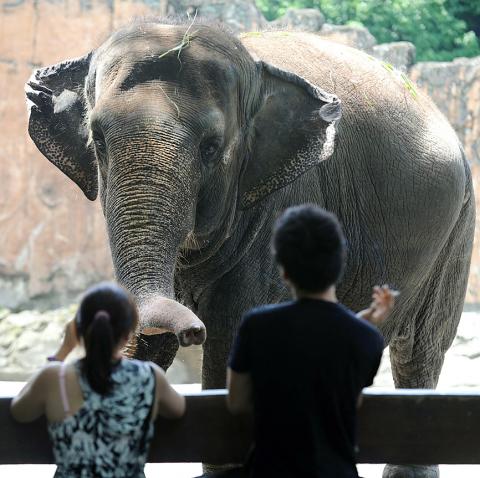An elderly elephant named Mali is the star at Manila’s zoo, but also the focus of a campaign alleging animal cruelty that has united the Philippines’ powerful bishops, global pop stars and a Nobel laureate.
Mali, who is 38, spends her days picking peanuts from children’s hands and being squirted with water in a concrete-floored enclosure that animal rights groups say is far too small for any elephant to enjoy living in.
They also say that, after being shipped from Sri Lanka when she was three years old, Mali is suffering profound loneliness after living her entire adult life without another elephant.

Photo: AFP
“She is definitely unwell. As much as her physical suffering ... there is also psychological suffering,” Rochelle Rigodon, campaign manager for Manila-based People for the Ethical Treatment of Animals (PETA), told reporters.
PETA began campaigning for Mali to be removed from the zoo seven years ago, and its efforts to have the elephant spend the rest of her life at a sanctuary in Thailand have brought together a strikingly diverse group of people.
British pop star Morrissey, 2003 Nobel laureate in literature J.M. Coetzee and famous animal welfare campaigner Jane Goodall have all written letters to the Philippine government asking for Mali to be transferred.
Archbishop Jose Palma, president of the influential Catholic Bishops Conference of the Philippines, has also written a letter calling for Mali to be shifted to Thailand.
He has formed an unlikely union with local fashion models and actresses, such as Isabel Roces and Chin-Chin Gutierrez, who have posted messages expressing concern about Mali’s plight to their masses of Twitter followers.
Their campaign has had some success, with Philippine President Benigno Aquino III ordering the Philippine Bureau of Animal Industry in May to evaluate if Mali should be transferred to Thailand. So far, no decision has been announced.
Activists say the problems at the zoo are not limited to Mali.
The zoo, owned by the City of Manila and built in 1959, is a far cry from its glory days in the early 1960s, when it boasted a huge menagerie of lions, tigers, bears, leopards, giraffes, chimpanzees and bison.
Many of the animals reside in half-century-old cages made of wire and bars, with the zoo operating on a budget of just US$1.4 million a year — small for its size, as it holds 717 animals from 102 species.
Philippine Animal Welfare Society executive director Anna Cabrera accused the zoo’s veterinarians and administrators of “gross incompetence.”
However, chief veterinarian Donald Manalastas insisted Mali and the other animals were treated well.
“We could do better but their [the animals’] care is never compromised,” Manalastas said.
He pointed to the advanced ages of Mali and another 38-year-old star of the zoo, Berta the hippopotamus, as proof that the animals were being looked after.
Manalastas also talked enthusiastically about the zoo’s success in breeding the Philippine freshwater crocodile, or Crocodylus mindorensis, which is critically endangered.
From an original four, these reptiles reproduced rapidly until there were 20 last year, Manalastas said. He added that they were able to trade eight to an overseas overseas zoo for a camel that will hopefully arrive next year.
The zoo undoubtedly remains a popular attraction, with 950,000 visitors a year, many of whom come from poor communities in and around Manila.
The Philippines has a dire poverty problem, with roughly one-quarter of the population of 100 million people living on US$1 dollar a day or less. The entrance fee for the zoo is set deliberately low at 40 pesos (US$0.95) for adults and 20 pesos for children to give the poorer citizens of Manila the opportunity to see wildlife and have a fun day out.
“This place is a social service, not a profit-oriented organization,” Manila City’s Parks and Recreations chief Deogracias Manimbo told reporters.

Nauru has started selling passports to fund climate action, but is so far struggling to attract new citizens to the low-lying, largely barren island in the Pacific Ocean. Nauru, one of the world’s smallest nations, has a novel plan to fund its fight against climate change by selling so-called “Golden Passports.” Selling for US$105,000 each, Nauru plans to drum up more than US$5 million in the first year of the “climate resilience citizenship” program. Almost six months after the scheme opened in February, Nauru has so far approved just six applications — covering two families and four individuals. Despite the slow start —

North Korean troops have started removing propaganda loudspeakers used to blare unsettling noises along the border, South Korea’s military said on Saturday, days after Seoul’s new administration dismantled ones on its side of the frontier. The two countries had already halted propaganda broadcasts along the demilitarized zone, Seoul’s military said in June after the election of South Korean President Lee Jae-myung, who is seeking to ease tensions with Pyongyang. The South Korean Ministry of National Defense on Monday last week said it had begun removing loudspeakers from its side of the border as “a practical measure aimed at helping ease

DEADLY TASTE TEST: Erin Patterson tried to kill her estranged husband three times, police said in one of the major claims not heard during her initial trial Australia’s recently convicted mushroom murderer also tried to poison her husband with bolognese pasta and chicken korma curry, according to testimony aired yesterday after a suppression order lapsed. Home cook Erin Patterson was found guilty last month of murdering her husband’s parents and elderly aunt in 2023, lacing their beef Wellington lunch with lethal death cap mushrooms. A series of potentially damning allegations about Patterson’s behavior in the lead-up to the meal were withheld from the jury to give the mother-of-two a fair trial. Supreme Court Justice Christopher Beale yesterday rejected an application to keep these allegations secret. Patterson tried to kill her

CORRUPTION PROBE: ‘I apologize for causing concern to the people, even though I am someone insignificant,’ Kim Keon-hee said ahead of questioning by prosecutors The wife of South Korea’s ousted former president Yoon Suk-yeol yesterday was questioned by a special prosecutor as investigators expanded a probe into suspicions of stock manipulation, bribery and interference in political party nominations. The investigation into Kim Keon-hee is one of three separate special prosecutor probes launched by the government targeting the presidency of Yoon, who was removed from office in April and rearrested last month over his brief imposition of martial law on Dec. 3 last year. The incident came during a seemingly routine standoff with the opposition, who he described as “anti-state” forces abusing their legislative majority to obstruct